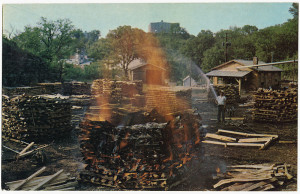A Guide To Tennessee Whiskey, The Law, And The Lincoln County Process
By Richard Thomas
When it comes to bar counter arguments, whether Tennessee Whiskey is nothing more than Bourbon from the Volunteer State is one of the great classics. This boozy dispute was supposedly closed in 2013 when the State of Tennessee passed a new whiskey law, one that finally addressed the issue of just what the state’s official whiskey was. That should have settled matters once and for all, except that the law had only been in force for several months before it was challenged in the courts and efforts at repeal or replacement began in the state house. At the time of publication the law still stands, but so does the argument, now raised from the realm of the wooden bar countertops to the marble facades of law and governance.
Whiskey, Volunteer State Style
The 2013 Tennessee State Whiskey Law essentially defined the state’s whiskey as Bourbon made with the extra step of the Lincoln County Process. The terms used to describe Tennessee Whiskey in the law were identical to the Federal Law defining Bourbon whiskey, plus two additions and one exemption. The additional requirements were that: 1) the whiskey be made in Tennessee and aged in the same county or neighboring counties; and 2) it be made with filtration through maple charcoal, also known as The Lincoln County Process (LCP). The exemption was for Prichard’s Distillery, who have been operating since 1997 and were grandfathered in.
The new law loosened already the already existing state whiskey laws regarding how whiskey made in the state could be matured. Prior to 2013, whiskey in Tennessee had to be distilled and aged not just in the state, but in the same county as it was made.
Now distilleries can warehouse and age their whiskey in counties adjacent to where the whiskey was distilled, opening up a somewhat wider area for warehousing. The raising of this subject prompted state authorities to look into what Diageo was doing with whiskey made at George Dickel in Tullahoma and shipped to Kentucky warehouses for maturation, but nothing untoward was found and the matter was dropped.
Is It The Wood That Makes It Good?
The LCP was central to the Tennessee Whiskey argument because from the end of Prohibition until the late 1990s there was first only one, and then just two whiskey distilleries in Tennessee, Jack Daniel’s and George Dickel, and both used it. Yet the LCP itself is a loosely defined process, as Jack Daniel’s and George Dickel each have their own versions of it.
Daniel’s drips its new make whiskey into 10-foot deep vats of maple charcoal, allowing it to slowly filter through for collection at the bottom and drainage. By contrast, Dickel chills their new make to 40 F (4.4 C) before filling 13-foot deep vats with it. The whiskey sits in the vat with the charcoal for a week before it is drained out. Afterward, both distilleries send the filtered new make whiskey to the filling station, put it into charred, new white oak barrels, and send it to the warehouse for aging.
Whatever version is used, the LCP is meant to produce a mellower whiskey. “Ultimately, I think the mellowing process adds to the finished product by what it can take away,” said Jack Daniel’s Master Distiller Jeff Arnett. “It takes away the oily mouth feel by removing fatty acids and it also helps to neutralize the acidity of the distillate. After days of filtering through charcoal, the whiskey becomes much cleaner, lighter, and sweeter on the palate. This change is the result of the mellowing process absorbing bitter tasting components into itself. While bourbon whiskeys are often described as ‘bold, peppery, and spicy,’ Lincoln County Process whiskeys are known to range from ‘sweet to oak’ in their character.”
Dickel’s version of the process achieves a similar effect, and well-informed readers will recognize that the added step of chilling the new make whiskey before pouring it over maple charcoal is very similar to the process of chill filtration, commonly applied to lower proof whiskeys around the world between dumping the barrels and bottling.
Tradition And Innovation?
The conflict over the 2013 Tennessee State Whiskey Law is usually seen through the lens of a conflict between its prime sponsor, Jack Daniel’s parent company Brown-Forman, and rival British drinks giant Diageo. The latter is the owner of Johnnie Walker, the world’s top-selling whiskey brand and currently in a tooth-and-nail battle with Jack Daniel’s to retain supremacy. Yet Diageo is also the owner of George Dickel.
But if Diageo is at the forefront of the effort to scrub the Tennessee Whiskey law, that law’s most vocal critic is Phil Prichard of Prichard’s Distillery. According to Prichard, the law both flies in the face of the wider scope of Tennessee whiskey tradition while also stifling innovation in the state’s burgeoning sector of small distillers.
On a historical note, Prichard points to his ancestor, Ben Prichard. “For over fifty years before Jasper Newton ‘Jack’ Daniel was even born,” said Prichard, “Ben had been making whiskey here in Tennessee. When my grandfather made whiskey, the Lincoln County Process had not yet been invented.”
Prichard pointed out that if his ancestor’s early 19th Century standards are used, Tennessee Whiskey should be made using heirloom white corn and pot stills, since those were fixture elements in those days. He also noted his own personal experiences with Federal liquor regulations, which previously allowed a whiskey to bear a state’s name simply because it was made there, and insisted the new law hurts small distillers and discourages experimentation by restricting the title of “Tennessee Whiskey” only to those whiskeys made using a narrow process.
Although he may have a larger historical point, but 4/5s of Prichard’s fellow small distillers dispute the notion that the 2013 law restricts them. Darek Bell of Corsair Artisan Distillery, one of the leading craft distilleries in the state and in the U.S., said, “Since we do not make a LCP whiskey, this is not really a big deal to us. As native Tennesseans we believe it is important for [Tennessee] Whiskey to be different and unique from [Kentucky] Bourbon. That is why we came out in favor [of the law]. We think anything that makes Tennessee Whiskey more distinctive, will be good for all Tennessee distillers.”
Competing Visions
Although at its heart what the Tennessee Whiskey dispute is about is competing interest, it can more easily be summarized as about competing visions. As it stands now, the prevailing vision is that of the 2013 state law, which bases Tennessee Whiskey around a technical process, the LCP, and de facto defines it as a major sub-category within Bourbon whiskey. By saying “Tennessee Whiskey is Bourbon plus this extra, important step,” the 2013 law has the advantage of building identity on something clear and tangible.
Prichard (although, interestingly, not Diageo) would define Tennessee Whiskey as a Protected Designation of Origin (PDO), a concept familiar to most as the “D.O.C.” that appears on certain wine bottles. This would define and protect Tennessee Whiskey solely or mostly on the basis of coming from a unique and traditional region.
Although this approach has merit, for it to truly work it would need to attract interest from distillers in neighboring Kentucky too. If America’s best known and top producing whiskey state isn’t interested in establishing a PDO for itself, then a purely singular PDO in Tennessee will carry as much weight as the similar definition did in the years before the 2013 law. Those were the days when the contrary side of the aforementioned classic of bar arguments went “Tennessee whiskey doesn’t exist, because it’s all just Bourbon anyway.”










